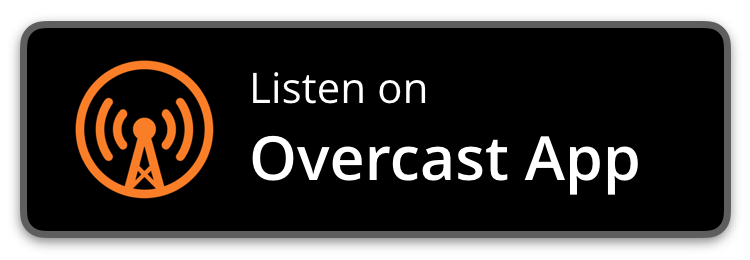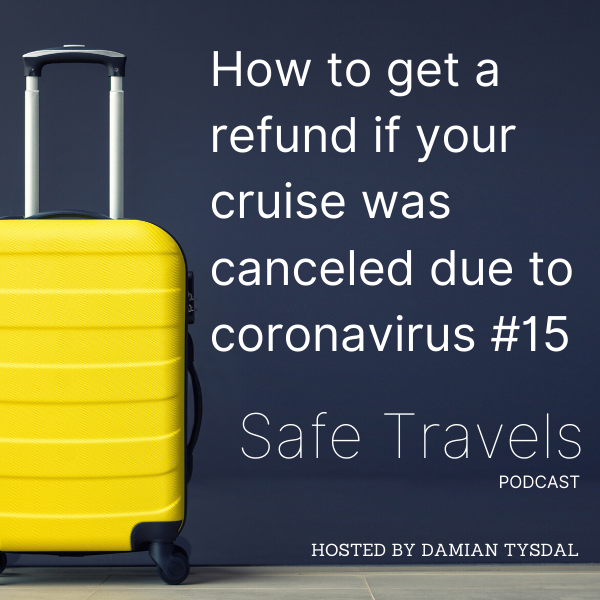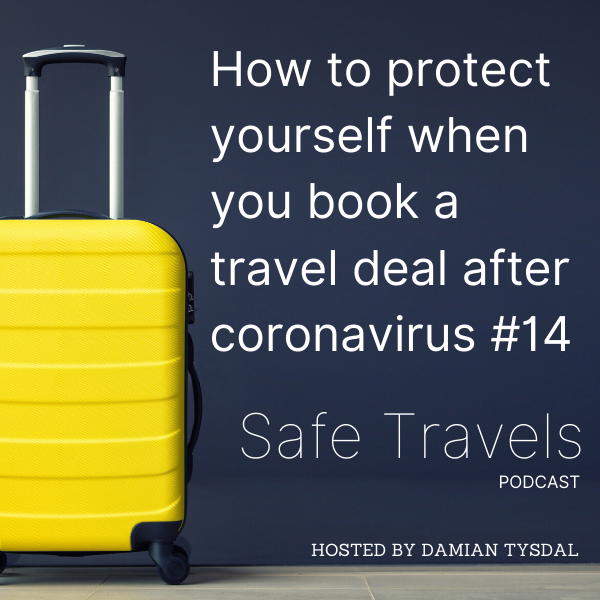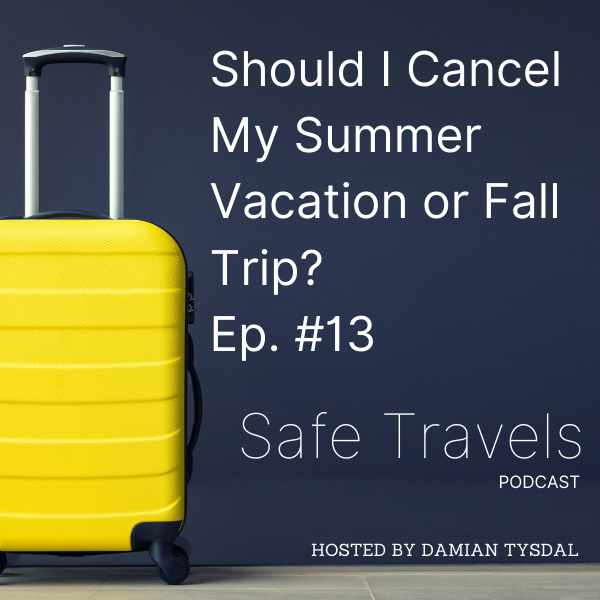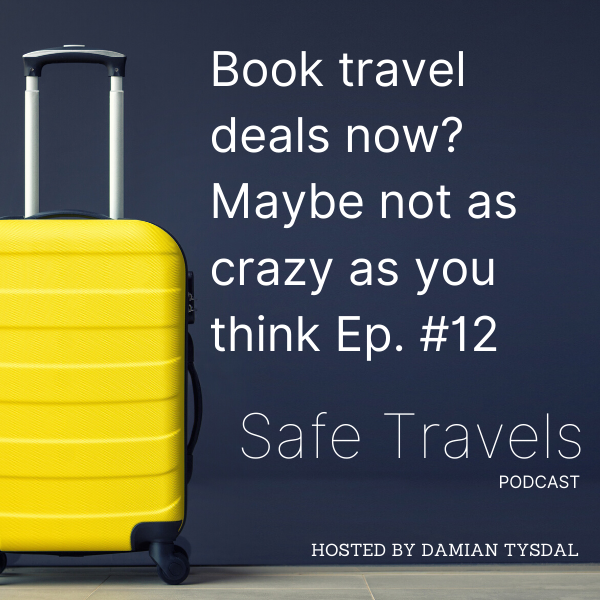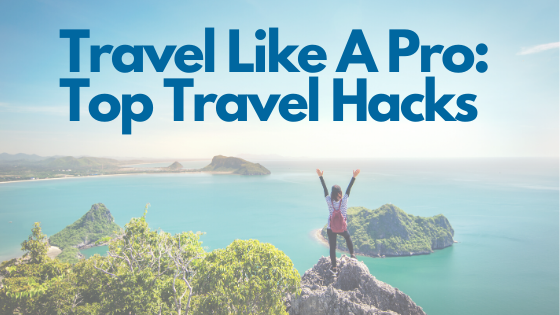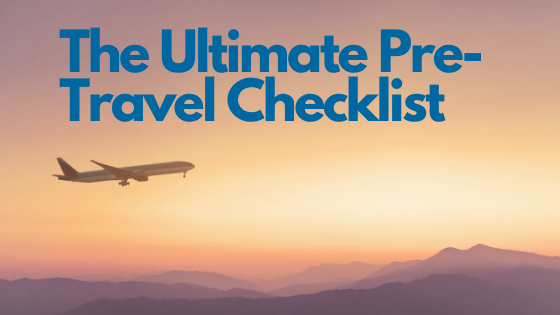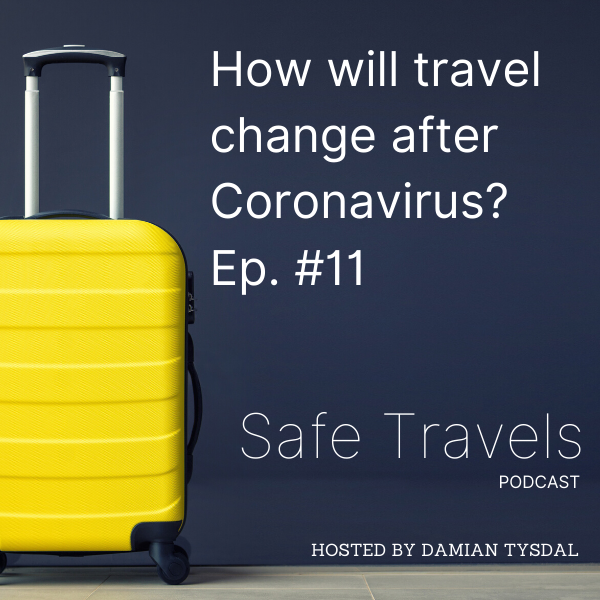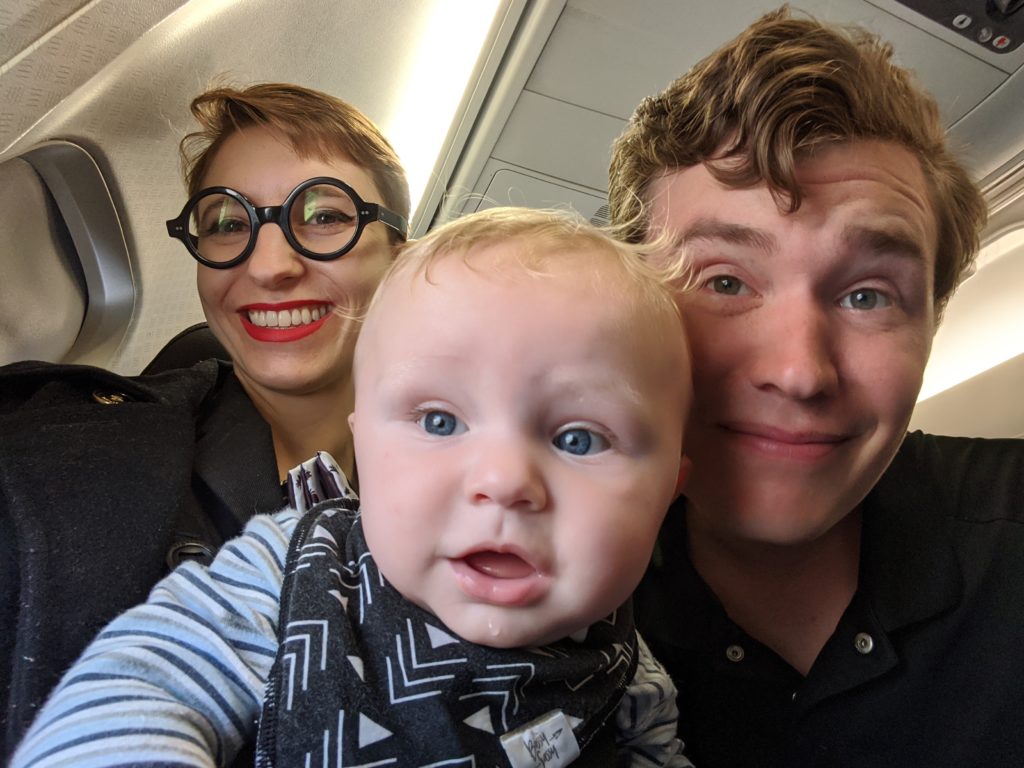
In this show we try to answer the concerns of many travelers who are thinking of booking travel for after coronavirus.
“How can I book post-Coronavirus trips, but also stay safe and protect my investment?”
I am joined by Simone Collins of TravelMax, a travel management company.
Simone discuss the ways they have assisted travelers during the pandemic, tips for booking flights, which airlines are the cleanest, and some general travel tips and hacks.
Selected Links from the Episode
- TravelMax
- Simone Collins in Twitter
- Airline social distancing measures
- Hanging packing organizer
- Study about homemade mask material effectiveness
Mask material study mentioned in show

Show Notes & Timestamps
- What TravelMax clients are traveling now? 00:01:57
- How Simone’s clients have been assisted during coronavirus 00:03:19
- What Simone is recommending to travelers trying to book 00:09:39
- What protective measures are airlines taking? 00:10:36
- Recommended personal precautions 00:14:24
- Why booking with 3rd party aggregators can cause problems 00:20:06
- General travel tips 00:25:44
- Unexpected travel hack…capes 00:26:14
- The packing gadget Simone swears by 00:27:11
- Common mistakes travelers make 00:28:42
Listen
Transcript
Damian: Thank you very much for joining us today.
Simone: Oh, it’s a pleasure. I’m so excited.
Damian: Would you mind, for those that aren’t aware of what you do, can you just share kind of a 30-second overview of what you do and what TraveMax does?
Simone: Sure. Yeah. I am the CEO along with my husband, Malcolm Collins of TraveMax, which is a travel management company specializing in corporate, entertainment, sports and production travel….and then in a sort of off-shoot branch, we’re also a wholesaler. So boutique travel agencies purchased their inventory through us in many cases to get access to our better negotiating power, which ultimately enables us to offer better terms to our direct clients. And really, we sell to everyone. I mean, many of our corporate clients have us do their leisure trips too. So that’s, that’s where our minds are.
Damian: And how did this start for you? How did you get started in this line of business?
Simone: Oh my goodness. By complete mistake. My husband Malcolm is a former neuroscientist turned entrepreneur and venture capitalist. I started out in the startup world and , both of us ended up doing what’s called a search fund. Like miniature private equity. We raised money from investors to find one gem of a company that we thought would be a really great investment to grow over time with our investors money, and then once we found that company, we raised more money from our investors to acquire it and then operate it. And here we are, we did not expect to find and acquire a travel business. In fact, I would say in our investment world, something like travel is usually seen as outside the focus. They love things like regulatory compliance software and you know, very stable, recurring revenue businesses.
But TraveMax was just such a compelling company. We loved the hybrid wholesaler and corporate travel management angle, and we were just enchanted by the team, it’s an amazing business.
Damian: It’s a funny “fall into it†kind of story.
Simone: It was quite the misadventure, but that, that’s kind of how we roll.
Damian: And during this right now, you mentioned in some of our emails back and forth that you do have plenty of clients that are traveling now. Can you kind of explain who is traveling during coronavirus right now?
Simone: Yeah, I mean, so essential workers, as we’ve all heard on the news, like medical professionals are often traveling, to help in areas where there’s great need. Also, we do a lot of travel for other types of essential workers considered that engineers need to fix…factory parts in various parts of the world. They can’t do that remotely from their machines. Though, of course, you can try to do it from your computer to help someone troubleshoot. So we are flying around the odd engineer to go fix things, specialists to do stuff that physically you have to do in person. And we’re just making sure that they travel safely.
There is the odd person who’s traveling in terms of discretionary travel. Usually it’s because there’s a family emergency. They need to take care of a loved one. They need to, I guess, you know, move out, for various reasons. It’s, there’s still a decent amount of travel taking place, which impresses us though. I mean, as far as we’re concerned, there’s no travel happening, relatively speaking. It’s nothing.
Damian: But even in that last case, it’s almost like that is essential travel for that person. Not in a way that you might expect or to find it normally.
Simone: No. Yes,
Damian: You know, of a family situation, something like that. They have no way around it.
Simone: Exactly.
Damian: And how have you helped your clients during this? Have you had, I assume there’s been a lot of requests for assistance re-arranging things, changing plans, how have you been helping them?
Simone: Oh my goodness. There was such a flurry of activity as all the cancellations came in, our team had a lot of work to do and sat on hold with airlines, struggling to get refunds in any sort, in many cases for hundreds of hours, collectively, maybe thousands at this point.
The majority of our customers didn’t have travel insurance, so those who didn’t, and most of the travel insurance policies that we didn’t have, those got really quickly resolved. For the rest of our customers we were fighting tooth and nail just to get special exceptions from airlines, which we have contracts with.
Nearly every major airline, meaning that we have a rep that we can call and say, you know, “Hey, can you help us out with this case?â€. So we have banks of waivers and favors that we can apply. So, we really dug deep into those to help all of our passengers get home safely wherever they needed to be. Now, when people are starting to travel again or asking us questions, we have a sort of a systematic process that we try to walk them through to make sure not only that financially there’ll be safe with this process, but also personally health wise, because there are so many factors to consider.
It’s not just about, “Oh, I’m worried about getting sick personallyâ€. Who are you going to go see? Are they at risk? Do you live with at risk people? You know, who is going to potentially be put at risk by this trip? And what can we do about this trip to protect you as much as possible?
Damian: And for those clients that are still abroad, maybe they’re away from their home…how are they dealing with their current situation? Are they, in general, quarantined? What’s their status right now?
Simone: Everyone who wanted to get home, we’ve gotten them home. We have access to humanitarian flights and a lot of insider tips like last minute flights that are coming out. We’re, we’re really accustomed to helping people with natural disasters, like hurricanes where you only have maybe a couple of hours to get someone out of an area. So we’re really familiar with sneaking people out, whether it’s political instability or a severe weather event, and they need to get out of a place. So we didn’t, we don’t really have anyone who, against their will, is opting to stay somewhere.
We do have people who’ve chosen to stay in places when, at the end of February when the news started getting increasingly serious, my father and his girlfriend were staying with my husband and infant in Peru where we have an apartment, cause that’s where TravelMax is…wholesale offices are. So we were there doing work and we were already scheduled to fly back for the month of March. But, my dad and his girlfriend decided to extend their stay in our apartment, and just ride out the pandemic in Peru because his home was in the Bay area, the San Francisco Bay area, where at the time that seemed to be the worst area of outbreak, you know, people were, as far as seeing it as like the landing place of Corona virus and all Asia based travelers were coming in through SFO and Oakland and San Jose airports. And then that was before people realized that a lot more people in New York were getting sick from travelers from Europe. So he just decided to stay in and ride it out.
It has been so fascinating to experience the Peruvian lockdown through employees and also through my dad. The Peruvian government is taking this so much more seriously than the United States government. There was even a period where it was so strict that only one gender could leave the house each day. And only that could be for essential purposes.
And keep in mind that in Italy, I mean, maybe you’d get fined if you didn’t have a good reason for being outside, but you could go outside if he wants it to. And they were really severely hit, and Peru, you know, there isn’t news about a really bad outbreak. It doesn’t appear to be that out of control. They’re just taking it seriously. So we admire the government’s response and it’s fun to see how different governments are responding.
But there are huge implications to this, you know, for who’s locked down. International travel this really affects how people are going to be able to move around from country to country. As the travel bans lift as certain countries, provinces, States, cities start to reopen, there have been times where certain States have mandated 14 day quarantine. Certain countries mandate 14 day quarantines or more. And when we have people getting out on the road, we need to warn them, you know, “Hey, you gotta watch out for places A, B, C, D, and E. Cause if you go to them. You’re going to have to stay locked down for 14 daysâ€.
Although, you know, just recently, I don’t know if you know this, but in Austria, you can not opt to pay around $250 to get a test that within an hour will allow you to circumvent their 14 day quarantine if you have antibodies or not. If you have antibiotics, if you don’t have the virus.
So it’s, it’s very complex in terms of where people are, how people might be stranded in the future, and where people have chosen to ride out the pandemic.
Damian: And I think you had mentioned that some people, you would say they’re not really worried….they’re not really that concerned about the situation. Are you aware of what their standpoint is on it? What’s their thinking as far as not being as concerned as many other people?
Simone: Yeah. We hear a lot of different approaches. The two most common are, “Oh, I think I already had itâ€, which they may very well have.
Then the other is, “Oh, you know, everyone’s going to get sick anyway. This thing spreads so much. It’s only a matter of time, you know, if I’m going to get it, if I’m gonna get it, if I’m going to die, I’m going to die. I’ve got my sanitary wipes. I’ve got, you know, hand sanitizer, like, let’s just do thisâ€. You know, they’re very resolved to just get through it.
Damian: Are you getting inquiries for future travel now other than those who would deem themselves necessarily to be traveling?
Simone: Absolutely. People are starting to book their holiday travel. They’re starting to book travel for 2021 absolutely, and we do have some people who are seeing good travel deals. For even like the month of November. So they’re like, “Oh, I’m going to book my Thanksgiving travelâ€. We’d warn people when they’re doing that because a lot of people are under the impression that all airlines are offering zero change fees and everything’s super permissive, that’s not necessarily the case for travel that’s being booked certain months in advance.
So we just want to make sure everyone’s really careful when they start making those bookings. But it’s, “now is a great time to bookâ€. Airlines are desperate to fill seats and also increase their cash flow, whatever it takes.
Damian: I think we’re seeing a lot of that now. That was kind of the main topic we were going to talk about, is helping those thinking about that. Everyone’s seeing the deals. Everyone’s looking into the future now that we know a bit more about the virus, we can kind of see the path working it’s way through. So it’s at least back on people’s radar that they might be able to travel again, or, you know, within the year perhaps. So they’re looking at these things. So, as a company, what are you advising to people that are starting to look at travel?
Simone: We are advising them to very carefully select their airlines. There’s a huge difference in, in different airlines approaches to social distancing and safety and also refunds to a certain extent. Though, I mean, at least with the U S government providing PPP loans, I think we’re seeing a little bit more control over what is and is not a refund.
So I mean, like really great airlines with blocked out middle seats, and unlimited seat selection and really good boarding policies. Delta, Southwest, Alaska…we’re trying to push people toward those few.
Damian: I was going to ask what, who’s standing out as far as things like that? Those that are blocking middle seats?
Simone: Yes. So Delta, Southwest and Alaska are blocking middle seats. Frontier, which is not one of our sort of recommended airlines at this time, has taken a very interesting approach recently, which may get them some backlash and that they’re charging, I think, $36 for you to pay to block out the seat next to you. And that’s kind of like, I know and appreciate their attempts to make money. I understand.
Damian: That sounds like airlines being airlines…
Simone: Yeah. Right? And they need to, frankly, they’re in a very dire situation…but really like the worst players I would say are Allegiant and Sun Country…they have almost no protective measures right now.
Middle of the road players… United and American are doing a pretty good job. They’re doing most of the measures to protect passengers.
Damian: In addition to blocking that middle seat, what are the other measures that, you say some are doing really good, some are doing nothing as somewhere in between. So other than middle seat blocking,what would be on that list?
Simone: Most are now requiring masks for passengers and crew, the Frontier, Jet Blue, and Spirit aren’t yet making masks available, which is important for passengers.
Some are cleaning before every flight. Some are not. And they’re only cleaning the flights overnight, which to me is a big deal. So Delta and Southwest clean before every flight as well as American and Hawaiian airlines, and I think that’s really important.
And then, you know, in other cases, back to front boarding is another thing that airlines are doing that currently is being practiced by Delta, American, Frontier and Hawaiian. They board this way to try to reduce the amount of humans passing by other humans, which is really key during this time.
Keep in mind this is changing on a day to day basis. Airlines are testing different things out, trying to figure out how to balance revenue maximization and their balance sheets, which are not looking so great right now…and passenger safety to try to win people over too and get them comfortable traveling. So what I’m saying now could change in a couple of days, but I would say that Delta’s approach and American’s approach has been very consistent.
United has been a little, they’ve tried to play it a little aggressively on the refunds front for a little bit. So to me, I think their corporate strategy might be a little bit less passenger-friendly than I would typically like. But still, they’re doing a lot of the safety measures that we’re looking for, and I think they are ultimately fighting for passenger’s best interests.
Damian: When you say United playing a little aggressive on the refund standpoint, what do you mean by that?
Simone: Early on in the process, they had a very creative definition of a flight change. So consider that, I think for Southwest, which of course, you know, has the most generous policies with regard to changes on all fronts…I think, you know, refunds will be, will be offered if a flight schedule changes at all. I may not have that 100% correct, but I think that that is correct.
Whereas with most other airlines, they’ll give you a refund if the schedule changes maybe more than an hour or two hours. With, with United for a while, they were getting really fast and loose with their definition of a. Like a schedule change where they would give a refund for that flight. Which for our entertainment and production clients and some of our engineering plants does not fly, uou know, you need to go in and out of the city in one day. If your flight’s delayed by six hours, that’s not going to work. And that’s when your return flight was going to go, so that, that’s something that we found to be problematic.
I think the department of transportation pushed back on that policy, so I think they’ve changed it, but it’s just something to really watch out for in the fine print or better yet, consult with an agent who can really easily check that stuff because, in some cases it’s really difficult to see what the change in cancellation policies are.
Damian: As far as, you know, individuals and personal precautions, what would you advise for people to do as far as that.
Simone: There are so many things you can do. Everyone’s talking about masks right now. , the general understanding of course, is that masks are to prevent you from getting other people sick. But that doesn’t mean that you can’t make an improvised cloth mask that actually is effective at filtering out particular very fine particulate matter.
Even one of my former colleagues and a good friend of ours named Eugenia O’Kelly recently, with a bunch of her fellow researchers at the University of Cambridge, did a study on what improvised home fabrics do a good job because trying to make their own masks now, and ultimately she found, and I can send this, this article to you if you want to include it in the show notes, it’s currently in pre-print, but they found that disposable vacuum bags, the HEPA filters are at least in their study I think it came out as a more effective material at filtering ultra fine particulate matter then an N-95 mask, you and we’ll have vacuums sitting around. And there’s stuff in everyday houses that could really make effective masks. So when we are advising clients who don’t necessarily have an N-95 mask that they can use or really effective, proper professional masks like this the kind of mask you might use in construction when sanding down a wall, which also has an N-95 filter in it, we encourage them to make improvise masks with better fabrics, you know, at least a doubled up shirts, if not denim, which can be more effective, or vacuum parts.
We also really encourage people when possible to rent cars and not take an Uber or a Lyft. It, to me, it’s such a moot point to agonize over whether your airline blocks out center seats and has back to front loading first, and then you get to go to the airport and return from the airport and maybe go all around the city, you are getting in a very enclosed space with a driver who…every day, like as part of their work needs to get in a very enclosed space with people who are more mobile. Right now we’re coming back from airports and you know, if anyone’s going to be exposed, it’s them. It’s really easy for you to cough or sneeze particles to filter around a car very quickly.
So we’re trying to encourage everyone to rent cars whenever possible, if they need to, and avoid as much contact with crowds in general, which also means to try to get, which is a little bit more difficult now, direct flights instead of connecting flights…some airlines had be sort of creative in their requirements for the Payroll Protection Plan to continue serving certain routes…have taken this sort of puddle jumping approach to getting people from point A to B, where they’ll stop at various airports to pick people up, allowing them to say that they’re still maintaining those routes.
I’d say that’s still better than a flight where you actually have to change planes, but it’s something that we really tried to highlight for our passengers. And point out is a potential risk if you’re really trying to protect yourself.
And I mean, the first thing that passengers need to ask again is, is who am I putting at risk? Am I at risk? Do I have a family member or roommate, someone that I work with closely who may be at risk? And then to be extra careful then, and maybe you can play it a little more fast and loose if nobody that you attend to come into contact with could be put at risk if you get sick.
Damian: And then, in other ways of protection. We’ve talked about , choosing the right travel suppliers…those that are taking the right measures to keep people safe.
And then we’ve talked a little bit about some personal choices as far as wearing masks and making smart choices as far as what you’re using to get from here to there as far as Uber’s or taxicabs. How about protecting finances? So if you’re booking a trip out into the future, and, we’re not quite through this yet, so we’re not quite sure what’s going to happen. Do you have any sort of tips as far as ways to protect your investment in that trip?
Simone: Yeah. Well, I mean, I’m sure you’re giving a lot of people advice on this too, on the insurance front. A lot of people are buying travel insurance. You have to get the right type of coverage based on what you think your risk is, to make getting a refund really easy. Aside from that, I would say working with a company like TravelMax, I mean, not to like to be blatantly self promoting here, but our team, we’re like a bunch of travel lawyers. You know, we’ll sit on hold and fight with an airline or a hotel or whatever it may be to fight to get a refund. And also just spend that time on hold that you don’t need to, to save you time, cause even when you book directly with an airline, even when they have a policy that involves you getting a refund, but that doesn’t mean they’re going to make it easy.
Most airlines really need help financially right now. And that means that it’s really not in their best interest to give you your cash back. They’re really trying to push for, “Hey, maintain the balance with us…we’lll make it last for two years instead of oneâ€. So if you really want to get your money back, book with a travel agency or either get travel insurance, that will make it really easy to have your insure refund you, or work with a travel agency that will sit on hold for you, cause it’s not going to be easy to get that refund.
But of course, check your refund policies. That’s really important. And more than that, do not book with a third party. There are OTAs, online travel agencies think, you know, Orbitz, Kayak or whatever, like, you know, basically third parties that are doing bookings that are larger, like Expedia for example.
Some of those are gonna go under, some of them are going out of business. Some of them are unable to provide refunds to passengers. And what happens is maybe the airline is sending the refund to those businesses, but because they’re going insolvent because they have so many cash problems. They will not be sending those refunds to their passengers.
And then also be really careful about booking, not just with third parties who are not directly the airline, or at least a very trusted travel agency, but resellers of some form of travel. I’m talking about where, you know, maybe people are reselling hotel rooms, on a third party website because you know that in that case, who knows where the refund is going to go. And those businesses are, again, at risk of bankruptcy. Right now, they’re not necessarily able to honor the same promises that they’ve been able to make when businesses is good and when their businesses are sound.
So you just have to be super, super careful and wary about that. And if you liked booking more informal travel to save money in the past, which my husband and I always do, like we always book Airbnb because we just can’t stomach, you know, really expensive hotel rooms. Maybe now’s not the time to be doing that because Airbnb typically has horrible refund policies, and you can’t, for example, show up at an Airbnb and say, “Oh, this is too dirty. You know, I want a different roomâ€. So try to go with solvent, large, stable businesses that have clear refund policies or work with experts who are able to make those checks for you and fight for your refunds for you
As long as you think that travel is uncertain or you might need to make changes. I mean, most of the people who work with us work with us because, you know, their trips are a little more complicated or they have larger corporate needs. Everyone knows it’s super easy to book your own travel and, and normally manage a trip using whatever channel you want when, when times are good.
I mean, there may be an odd scam or something, so it’s extra careful. You need to be extra careful now, but we wouldn’t say it’s a terrible idea to. Play it safe in general.
Damian: Yes. I think a lot of these tips are good going forward regardless of the situation. And I just wanted to clarify something as far as third party booking sites, like Expedia, cancellations in that case or refunds, does the buyer…are they not getting it directly through the airline? Is it, is it always going through that third party provider when they need to get a refund?
Simone: That really depends. And we have unique insight into this because we’re a wholesaler, so we actually have even OTAs that in some cases may purchase inventory through us, and we see how the process works. It really depends on how this third party chooses to handle their transactions.
In some cases, they will run their customer’s credit cards directly with the airline, meaning that if an airline grants a refund, the refund goes directly to that customer’s credit card.
In other cases, they will add a service fee or they will just for some other reason, charge the customer’s credit card, the passenger’s credit card to their own merchant. Or they may even use us as a merchant in some cases. And in that case, when the airline issues a refund, the refund will go directly to the merchant, and then the agency, meaning that it’s up to the agency, then to take that money and send it on again to the passenger, that can take a lot of time. I had already taken the airlines up to 21 days even more to issue refunds to passengers.
So it’s just an unnecessary complication that we really wouldn’t recommend. And frankly, you know, if you want to buy travel online or a flight online, you don’t want to work with an agency, there’s no reason why not, although sometimes the prices are slightly higher, usually not these days to put directly on the airline’s website.
It’s just a safer way to go.
Damian: I think that will be surprising to a lot of listeners…the fact that there could be so many complications in using one of the comparison sites, because it makes it very easy to shop for your flight. But, I think a lot of people would be surprised to know that there could be so much complication when it comes to a refund or any sort of changes, and you don’t know exactly who was going through it. So I think that will be very helpful.
Simone: And as a general PSA, a really important thing is. You probably, I mean, like if you as a random listener have probably purchased travel from like some random third party when you thought you were buying it directly from the vendor, because, meta search engines, like for flights like Kayak, like Google flights, they serve inventory from anyone who’s decided to participate in that meta search engine just serve their content onto it.
And in some of these cases, they’re clients of ours…and I get so many calls, every week from passengers who thought they bought a flight directly from Delta, who thought they’d bought a flight directly from United, just cause they sort of click, click, click…hey made the purchase, it was done.
They didn’t realize that they were actually buying from an agency. And so they call the airline. And then the airline gives them my cell phone number. They call my cell phone number and they’re like, what happened? I bought a flight from Delta and then now they won’t give me a refund cause they said it was purchased through TravelMax.
And then I have to find the agency that sold the inventory. So just be really careful who you’re buying from. You know, just because you see a flight on Kayak or you see a flight on Google flights and you go ahead and you just click whatever the best price is and buy it, that doesn’t mean that you’re buying directly from the airline.
I mean…in the end, you’re buying the airline’s inventory, but there’s another third party in there that’s going to complicate things.
Damian: So in the end, I think you said this a minute ago, if you’re not using an agent, go directly to the supplier versus one of the…a comparison site or a third party,
Simone: yeah, and only an agent that you trust. That’s solvent. That’s a real person. You want to make sure you know who you’re working with.
Damian: Well, great. That kind of transitions us…we’ll move away from coronavirus a little bit, I’d like to finish with just some general travel advice, that’s what the podcast is about, is helping people with worry free travel.
And as an expert in travel management, you have a ton of clients, you send them to all sorts of destinations, and experience a lot of different situations. So I’m sure you can provide some insights. And you might’ve covered a few of these before, but, what sort of essential tips would you give to travelers if they want to limit their worries?
Simone: Well, one thing that we have really started to swear by is to schedule. Cars to pick us up at airports, especially now that we have an infant, in other countries especially, cause often it’s very inexpensive. It may cost exactly the same as an Uber, but then you have someone waiting for you with a car that’s ready to pick you up.
In terms of traveling with an infant, we did that a lot…our baby was three weeks old when he started flying internationally and nationally.
So my favorite travel tip is…we purchased a bunch of tapes when I was pregnant cause we tried to hide the fact that I was pregnant so people wouldn’t, you know, not take me seriously professionally.
And we just use those same capes that we use to hide the pregnancy, to basically put our baby in a sling on my body and keep the baby under the cape. And no one even knew that I had an infant with me. Plus it sort of blocked him, you know, going through TSA and everything, from like sneezing and coughing and anything else.
Because whether or not there is a current virus they’re always at risk. Individuals who are traveling, who may be pregnant, who may have an infant that hasn’t had all its vaccines. So, now I swear by capes, which you can buy, custom made, on sites like Etsy for under a hundred dollars, that are really nice.
Packing minimally is such a big difference because hauling around bags, as you know, it’s the worst thing in the world.
So what I swear by is, and you can get these on Amazon, these hanging shelves that collapse into a carry on suitcase, but that allows you to fold your clothes, socks, underwear…it’s like quite a lot of clothing into three or four shelves that then collapse and fold into a very, very compact suitcase shaped bag.
Essentially you put it into your suitcase, there’s still more room in your carry-on suitcase after that and has been stuffed in, and then all you have to do is just hang it up.
There’s really no unpacking. There’s no digging through, a bunch of bunched up clothes. I actually live out of that now, and we haven’t traveled in quite some time now because of the pandemic, but all my clothes are still neatly folded into this hanging shelf system for travel, and it’s, it’s…
Damian: not seen that before.
Simone: they’re amazing. It’s just hanging right above my carry on bag in my closet and all I have to do is just basically dump it down if I need to move, which we always do. So I recommend that you really don’t need all those clothes.
Damian: Yeah. Well we’re definitely going to link to this because I need to check it out too. So, just to clarify, I’m kind of picturing, I think my wife has some sort of shoe hanger, so it’s like little pockets and it hangs up and I could see where they might collapse as it’s something kind of like that.
Simone: It’s exactly like that, but like a little longer, like wider, so you can fold in clothing,
Damian: that’s definitely, that sounds great.
Simone: lifesaver. It’s one of the best purchases I have ever made.
Damian:So mistakes, people mess things up all the time. What are common mistakes that you see travelers making that you can help them avoid?
Simone: I think we discussed one in depth, which is not knowing who you’re buying from, that that’s a huge thing. One thing that we see, cause we see so many trips come through us all the time and we see very clear patterns and who is happy with their trip and who is not. And a lot of it comes down to knowing what you want to optimize for and being willing to pay for the stuff that matters to you.
The hotels and other services are really good at marketing very cheap products to make them look good. But there’s a reason why, unless you’re talking about a country where prices are just generally lower, the super cheapest flights and the super cheapest products are super cheap…whether it’s basic economy or, you know “four star hotel†that’s suspiciously low priced, you know, we often give people those lowest price options, like basic economy where you can’t bring on a suitcase.
You can’t basically have to pay someone $5 for them to just look at you, and we’ve given people quotes for the cheapest hotels and often they choose it because they want to save as much money as possible and the photos look okay, and then they’re miserable on their trip and it really wasn’t worth it to, you know, save $20 here, $50 there, maybe even a hundred dollars to go through that discomfort. So no. What this is about, you know, whether it’s business travel or leisure traveling, you probably want to be comfortable and it’s not always best to travel based on the lowest price available, which we see so many people tempted to do.
Damian:But then going back to looking at some of the great deals right now, how would you, how would you balance those two things out, the understanding that you get what you pay for, but also you see a deal that you just can’t pass up on.
Simone: I think it’s just a matter of weighing the risks and understanding the company. If it’s a product or service that, you know, I’ve got on a United flight before you say, yeah, this is all going to be good. And you’ve seen what United’s policies are. Yeah. I mean, I wouldn’t worry about deals like that.
When you know what their refund policies are and you know, Hey, there’s a risk that I may not be able to do this. Go for it 100%, just avoid…there will be a lot of travel scams that come out of the pandemic. There are already weird pandemics scams, coming out. So I would just say, if you’re going to go for a deal, go for a deal that is directly with the vendor.
So there’s not some, you know, third party in between who might be misrepresenting information, and only go with vendors that you trust and that you believe are financially solvent.
Damian: Yeah. It seems like putting the value in the company.
Simone: Yeah, because I mean, in the travel industry, businesses will start dropping like flies. Already plenty of airlines have filed for bankruptcy or whatever the national equivalent is…and we…even in times with the smaller airlines that we’re accustomed to working with. Oh, they would disappear all the time.
I think people don’t realize, especially with smaller airline brands, how actually easy it is to create an airline because you just rent everything. You rent the airplanes, you get, you know, a small crew, very easily you rent that really crappy part of an airport. You know, you get those slots. It’s, it’s not that hard, meaning that the airlines are surprisingly delicate, especially the smaller ones. So it’s, it’s really important to be careful.
Damian:And do you have any sort of final big idea, piece of advice for travelers?
Simone: Yeah, I would say, you know, travel is safe. Travel is, is, okay. I mean, you’re, you’re putting yourself at risk by exposing yourself to people but you have to consider all the unregulated ways in which you were being exposed to people every day.
When you go to grocery stores, if you’re going to some place where people aren’t being really careful about physical distance, getting in an Uber or Lyft or a taxi or on a bus, all of those involve exposures to people.
You know, it’s, it’s very, where we are right now is, is very similar to where people are with driving versus flying. It’s illogical that people would be afraid of flying when you consider that the most dangerous thing you do is get on a freeway in normal traffic and get to the airport.
Driving is just so much more dangerous from a statistical standpoint and flying right now and traveling right now…I would consider it to actually be safer than many other things that you might do because they are, airlines, travel vendors, hotels especially are subject to so much scrutiny right now.
They have to clean things extra. You know, many airports are starting to do temperature checks, provide testing. I would rather go where there’s a lot of scrutiny and a lot of checking and not where you’re just not conveniently hearing about things going wrong, because to your point earlier, a lot of people already have gotten Codin-19 without knowing it, just because this is a big measurement problem and a big, you know, being aware of the problem spreading issue.
So if you want to travel, travel, just be smart about it.
Damian: Great advice. What’s the first destination after the coronavirus is done? What’s the first recreational, not for work, but for the place that you want to go with your family?
Simone: Oh gosh, we were really hoping to go to Zurich. I’ve never been, and we had earmarked some time in August to go out there. I don’t know if that’ll happen. but we’re super keen on it. We like taking trips where we just sort of live somewhere, in an Airbnb for a week, and just.
Actually work there. We’ll take a vacation, but we just work and live and commute and go grocery shopping and maybe get a haircut or you know, like a doctor’s appointment to really see what it’s like to live there. We did that with Ireland in January. We did that with Seoul, which was an amazing experience, the previous year.
So I highly recommend those types of vacations. They’re, they’re wonderful. And now that remote work is more pervasive. You can totally do it.
Damian:where can people find you online if they want to read more about what you do and work on the track you down online?
Simone: You can learn about travel at travelmax.com. and you can always feel free to email travel questions to us. If you want to sanity test something or if you want help with travel, I can connect you to one of our most skilled team members related to any trip you want to take. You can email ceo@travelmax.com.
Damian: Fantastic. Thank you very much for joining us today. You’ve provided a lot of great insight. I think it will be very helpful and I appreciate it.
Simone: What a pleasure it was. Thank you.



